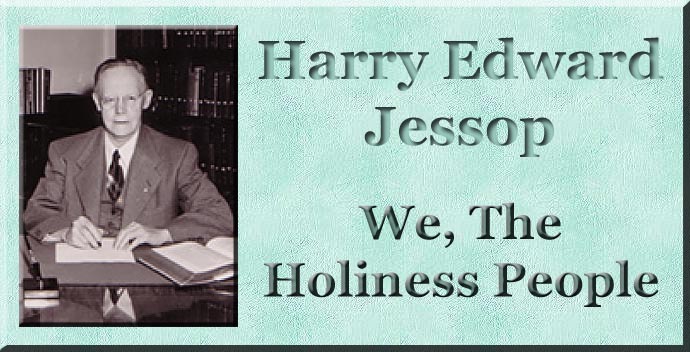
We, The Holiness People
By Harry E. Jessop
Introducing our Theme
|
In the pages which follow, we have sought to set before the reader an outline of the things which the Holiness People believe and teach. While this has been undertaken as a personal project, leaders in the Holiness Movement who have read the manuscript have expressed their approval and have urged its publication. The annual meeting of The National Association for the Promotion of Holiness at Minneapolis 1948, on the recommendation of the President, gave it an unqualified endorsement. We are conscious of the limitations of the book, but trust that it may at least become a prompter to someone with more ability for the work and more time at his disposal to do something more worthy. The days in which we live have destructive characteristics which every observant person is compelled to recognize. In the world at large there is alarming wickedness, answering, many believe, to the prophetic description recorded by Paul the Apostle in his letter to Timothy: "This know also, that in the last days perilous times shall come. For men shall be lovers of their own selves, covetous, boasters, proud, blasphemers, disobedient to parents, unthankful, unholy, without natural affection, trucebreakers, false accusers, incontinent, fierce, despisers of those that are good, traitors, heady, high-minded, lovers of pleasures more than lovers of God; having a form of godliness, but denying the power thereof: from such turn away." 2 Tim. 3:1-5. Within the Church also there has developed an amazing looseness of thought with regard to Christian doctrine, and with it a serious condition relative to spiritual experience, answering again, it is believed, to a further prophetic apostolic declaration: "For the time will come when they will not endure sound doctrine; but after their own lusts shall they heap to themselves teachers, having itching ears; and they shall turn away their ears from the truth, and shall be turned unto fables. But watch thou in all things, endure afflictions, do the work of an evangelist, make full proof of thy ministry." 2 Tim. 4:3-5. That these things are now upon us is a fact which few who will honestly face the situation will be tempted to deny, but the question which faces us is, What can be done about it? The Holiness People are seeking to do something about it. They are not doing as much as they should do, but they are at least alive to the problem, and are moving forward with a definite program, insisting on the fact of God's power to save from sin as a glorious possibility in the world in which we live. In this testimony concerning the Holiness Movement we do not desire to convey the impression that all who associate themselves with it are necessarily holy. Like ancient Israel, when separating itself from Egypt, every great movement has had its mixed multitude of stragglers and hangers on. Not all who have been with us have been of us. We say it with shame, but we must be honest and say it. Many unholy things have been done in the name of holiness. As in the Church's early days, so in these our days, there have been "men who crept in unawares, ungodly men, turning the grace of our God into lasciviousness." Some have taken up the doctrine of Holiness as a mental plaything. They have argued about it, and even fought for it, but they have not adorned it. Some have hastily adopted a profession of the experience without realizing that to enter into it a death route must needs be trodden which alone can take the soul to the doorway of an effectual faith. They have lived on pious phrases, but it has been evident to all that they have never entered into a conscious experience of the deep things of God. We offer no defense for such delinquents. Concerning them, our heads bow in shame; yet unhesitatingly we declare our faith in the Divinely revealed possibility of deliverance from indwelling sin for all who will yield completely to God and wholeheartedly obey Him. We shall confine ourselves more especially to those subjects about which the Holiness People are so often called into question, with only brief and passing statements on the things about which all evangelical believers are generally inclined to agree. H. E. J. Chicago, 1948 |
|
 |
 |
|
|
|
-
Site Navigation
 Home
Home What's New
What's New Bible
Bible Photos
Photos Hiking
Hiking E-Books
E-Books Genealogy
Genealogy Profile
Free Plug-ins You May Need
Profile
Free Plug-ins You May Need
 Get Java
Get Java.png) Get Flash
Get Flash Get 7-Zip
Get 7-Zip Get Acrobat Reader
Get Acrobat Reader Get TheWORD
Get TheWORD